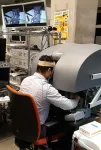(Press-News.org) Quality of life for people with dementia living in residential and nursing home care substantially improved after staff took part in a digital training programme that was specially adapted to Covid-19 restrictions. The training also led to a significant drop in the prescription of potentially harmful sedative medications to residents.
The iWHELD programme supported care home staff in delivering personalised care and encouraging meaningful social interactions. Through a digital platform featuring live coaching sessions led by trained coaches, the programme supported homes during the Covid-19 pandemic to enhance care and share best practices among peers.
Published Alzheimer’s & Dementia, the journal of the Alzheimer’s Association, the trial was delivered to staff supporting more than 700 residents with dementia across 149 residential homes in the UK, comparing iWHELD with usual care. In the iWHELD group, researchers found particular benefits in residents who contracted Covid-19, those who showed signs of agitation when the study began, and those taking psychiatric medications.
Led by the University of Exeter and King’s College London, and funded by UK Research and Innovation (UKRI), iWHELD is designed to support carers and residents by training staff in delivering personalised care, which puts residents at the heart of decision-making. The programme was specially adapted during the pandemic, so that it could be delivered remotely, with support available for care home staff, even in the most challenging circumstances for care homes.
Joanne McDermid, creator of the iWHELD platform and lead author of the paper, said: “Urgent action is needed to ensure care homes have access to dementia care training and support that is both high quality and shown to be effective. Every person deserves thoughtful and compassionate care and not everyone is receiving it. In response to the unfolding global pandemic, iWHELD was created as a ground-breaking, first-of-its-kind solution, placing care staff and people living with dementia at the heart of support for care homes and nursing homes. iWHELD leverages digital innovation to bring together stories, ideas, and communities. It’s the first programme to provide an effective, evidence based, affordable and scalable solution that can address the needs of care and nursing homes and critically, to improve the lives of the people with dementia.”
Katie Ives, manager of Stonebow House care home in Worcestershire, took part in the iWHELD training along with her management team. She said: “We all really enjoyed it, and it’s made a huge difference to some of our residents. As part of the training around personalised care, we’ve realised we need to change our approaches and even our demeanours to communicate effectively with residents – so if someone is quite reserved, being very bubbly is less effective and relatable to that person. We’ve always tailored our approach to residents, but now we offer a wider variety of activities and clubs to suit people’s interests in their lives, and we’re seeing some residents spend more time in communal areas and less time in their rooms as a result.”
Professor Clive Ballard, of the University of Exeter Medical School, senior author on the paper, said: “People with dementia living in residential and nursing home care are among the most vulnerable in society, and care homes and their staff perform an extremely challenging role. iWHELD is an effective, practical, and affordable programme that can enable staff to improve the lives of people with dementia and can be delivered nationally and internationally – even amidst a pandemic.”
The paper is entitled ‘Impact of the iWHELD Digital Person-Centered Care Program on Quality of Life, Agitation and Psychotropic Medications in People with Dementia Living in Nursing Homes during the COVID-19 Pandemic: A Randomized Controlled Trial’, published in Alzheimer’s & Dementia.
The research was supported by the National Institute for Health anc Care Research (NIHR) Biomedical Research Centre at South London and Maudsley NHS Foundation Trust and King’s College London, the NIHR Exeter Biomedical Research Centre, and the NIHR Applied Research Collaboration South West Peninsula (PenARC).
END
UC Riverside scientists have discovered a stealth molecular weapon that plants use to attack the cells of invading gray mold.
If you’ve ever seen a fuzzy piece of fruit in your fridge, you’ve seen gray mold. It is an aggressive fungus that infects more than 1,400 different plant species: almost all fruits, vegetables, and many flowers. It is the second most damaging fungus for food crops in the world, causing billions in annual crop losses.
A new paper in the journal Cell Host & Microbe describes how plants send tiny, innocuous-seeming lipid “bubbles” filled with RNA across enemy lines, into the cells of the aggressive mold. Once ...
People who received gentle electric currents on the back of their heads learned to maneuver a robotic surgery tool in virtual reality and then in a real setting much more easily than people who didn’t receive those nudges, a new study shows.
The findings offer the first glimpse of how stimulating a specific part of the brain called the cerebellum could help health care professionals take what they learn in virtual reality to real operating rooms, a much-needed transition in a field that increasingly relies on digital simulation training, said author and Johns Hopkins University roboticist Jeremy ...
A team of scientists from Icahn School of Medicine at Mount Sinai has developed a groundbreaking statistical technique, “BridgePRS,” to enhance disease prediction in people of non-European ancestry, particularly those of African descent. This development represents a substantial step towards reducing health care inequities and a future of more personalized and precise medical interventions based on genetic information. Details of their work were published in Nature Genetics on Wednesday, December 20.
Current polygenic risk scores (PRS), essential tools for predicting disease risk encoded in our ...
A groundbreaking new technique invented by researchers at the USC Dornsife College of Letters, Arts and Science may revolutionize the field of synthetic biology. Known as CReATiNG (Cloning Reprogramming and Assembling Tiled Natural Genomic DNA), the method offers a simpler and more cost-effective approach to constructing synthetic chromosomes. It could significantly advance genetic engineering and enable a wide range of advances in medicine, biotechnology, biofuel production and even space exploration.
CReATiNG works by cloning and reassembling natural DNA segments from yeast, allowing scientists to create synthetic chromosomes that can replace their native counterparts in cells. ...
IOP Publishing (IOPP) has secured its first ‘Read and Publish’ transformative agreement in Taiwan, demonstrating its dedication to expanding open access (OA) to research in the Asia-Pacific (APAC) region and at scale globally.
The three-year transformative agreement with the Physics Research Promotion Centre, which is part of the National Science and Technology Council (NSTC), will enable 20 Taiwanese universities to offer their researchers unlimited OA publishing at no cost to them. The agreement will also allow authors to retain copyright ...
Adjuvant therapies to help infertile women conceive by IVF - especially those whose treatments have been unsuccessful in the past - are now a common feature both before and during the treatment cycle. Now, a new analysis of the evidence for many nutritional supplements and diets thought to improve outcome in IVF has concluded that adopting a Mediterranean diet during treatment would offer a single ‘straightforward approach’ with good evidence of benefit in contrast to that of a Western diet.
Evidence from studies of nine commonly used nutritional supplements was found to be inconsistent and not always of good quality. The analysis, by Professor Roger ...
A review in the Journal of Internal Medicine explores the potential of non-invasive interventions such as light, sound, and magnets to stimulate gamma brain waves for the treatment of Alzheimer’s disease. Such strategies may be beneficial because Alzheimer’s disease is characterized by reduced fast brain oscillations in the gamma range (30–100 Hz).
The authors note that recent studies reveal that it is feasible and safe to induce 40 Hz brain activity in patients with Alzheimer’s disease through a range of methods. Also, preliminary evidence suggests that such treatment can yield beneficial ...
The inability to burp—called retrograde cricopharyngeus dysfunction (R-CPD)—is caused by failure of the throat’s cricopharyngeal muscle to relax to allow the outward passage of gas. An interview-based study in Neurogastroenterology & Motility that included 199 adults affected by the condition reveals the impact of R-CPD on quality of life.
Most participants reported abdominal bloating, socially awkward gurgling noises, excessive flatulence, and difficulty vomiting. Only half discussed their symptoms with their primary care clinician, and 90% felt they did not receive ...
Women who lost a parent early in life may be more likely to experience separation anxiety with romantic partners during adulthood, according to a study published in Stress and Health. In addition to feeling distressed when separated from their partners, these women may also experience anxious attachment, or worry that significant others will not be available at times of need.
The study included 60 women who lost one or both parents in their youth and 60 who had living parents. Based on participants’ answers to questionnaires, women who lost a parent reported higher levels of anxious attachment and adult separation anxiety ...
New research indicates that higher doses of topical corticosteroids, which are commonly used to treat inflammatory skin conditions, are linked with elevated risks of osteoporosis and bone fractures associated with osteoporosis. The findings are published in the Journal of the European Academy of Dermatology and Venereology and are based on information from the Taiwan National Health Insurance Research Database.
Investigators selected 129,682 osteoporosis cases and 34,999 major osteoporotic fracture (MOF) cases and matched them with 518,728 and 139,996 controls (without osteoporosis or MOF) ...





